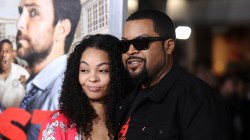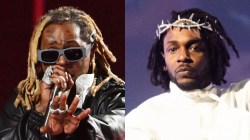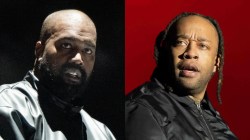On June 3, 50 Cent is scheduled to release his fifth retail, studio album, Animal Ambition: An Untamed Desire To Win. Fif is selling this one as a reboot of sorts, given his move from Shady/Aftermath/Interscope over to Capitol. His detractors are likely viewing this through the dreaded, clichéd lens of a “make or break” album. Honestly, I don’t think it fits in either category. His net worth may have exploded, and he certainly has a larger audience, but I don’t think 50 is doing anything we haven’t seen since his shelved Columbia Records project, Power of the Dollar. He’s still alternating between violent and aspirational subject matter tinged with catchy, R&B-influenced choruses. And when he wants to draw attention to a project, he’s still playing up his beefs—whether they’re with executives, fellow rappers or anyone else who doesn’t pose a direct threat. While he now has the financial freedom and creative leverage to make any kind of album he wants, I think he’ll continue unsuccessfully chasing another Top 10 single.
I also don’t know if any of Hip Hop’s dominant media outlets want to have a nuanced discussion about 50 Cent. Do you really want to be The Source in 2003 and not have the benefit of a 50 Cent cover story as well as the inflammatory quotes and the sales boost that usually accompany such an article? It’s not so much a general fear of 50, although his feuds with The Sourceand WorldStarHipHop are a good example of what happens when he’s pissed. But if you’re a media outlet in 2014, then a convo with or about the guy with 7.41 million Twitter followers all potentially ready to engage with your coverage is a necessary business decision.
Power Of The Dollar: 50 Cent Joins Rap’s Cash Kings
In his recent press, most of the focus has shifted to 50’s various beefs and his business acumen, and I don’t think that’s an accident. In March of 2011, Forbes.com listed Hip Hop’s top-earning performers based on valuation of their current holdings, past earnings, financial documents and feedback from analysts, attorneys and managers. Sean Combs ranked first with $475 million, followed by Jay Z at $450 million, Dr. Dre at $125 million and 50 Cent with $100 million. Think about that; 50 Cent forced himself into the same conversation as Jay Z and Sean Combs. Jay enjoyed the considerable marketing push of Def Jam for most of his career (from 1996 through 2006), and Combs benefited from the cultural capital of being associated with Biggie and the financial capital of his moves as the founder of Bad Boy. Conversely, 50 Cent basically turned some mixtapes into a partnership with Eminem and Dr. Dre, a landmark album and one of Hip Hop’s most lucrative pre-Beats/Apple business deals. By buying into the privately owned company Glaceau early, 50 Cent netted an estimated figure between $60 million and $100 million when Coca-Cola purchased the company for $4.1 billion in May of 2007.

AD LOADING...
Like My Style: 50 Cent’s Stylistic Shift & Emotional Appeal
So I’d argue that no matter what, 50 won, and he’s still very much relevant in and outside of Hip Hop. But how much are people talking about 50 Cent’s music? It’s not that the music is particularly bad; it’s just not great. That’s not a diss, because I do think 50 has previously approached a level of greatness. So I think those expecting him to return to such levels either become frustrated or just indifferent at his repeated failure to maintain that standard. I think there will always be a section of his fans so enraptured by the combination of 50 Cent’s personal narrative and the skillful execution of Get Rich Or Die Tryin’ that it doesn’t matter to them if 50 can ever reach such levels of greatness again. I’m not one of those people, because I can separate the narrative from the music. Tracks such as “Twisted,”“Irregular Heartbeat,” and “Pilot” tap into the catchy, melodic aspects of Get Rich Or Die Tryin’. But they don’t capture the emotions found on “Many Men,” “G’d Up” or even “I Get Money.”
Before sustaining a gunshot wound to the mouth, I think 50 Cent was a more technically proficient emcee. He articulated better, so he had a better ability to vary his cadences, and his flow was nimble if and when he chose to showcase such a wordy delivery. Fif saying, “I’ma tell you what Banks told me, cuz go ahead switch the style up / If niggas hate then let them hate, and watch the money pile up,” fits the mythology of 50 Cent as one of Hip Hop’s ultimate, postmodern hustlers. But it’s just that—a myth. The change in 50’s post-shooting vocal delivery are rather obvious even by his own admission. I’d make the argument those limitations didn’t matter because 50 Cent had access to Dr. Dre production and mastering and because 50 Cent demonstrated a palpable kind of authenticity. You felt him.

AD LOADING...
I can’t speak for everyone, but thinking back to “Many Men,” I’ve only heard that kind of tangible anger and vulnerability while not compromising any masculinity in a select group of emcees. I remember hearing Tupac display it on “So Many Tears,” and I remember hearing B.G. showcase it when rhyming about how he used to snort heroin. Throw in a few classic lines from Prodigy, Scarface, Ice Cube or whomever your favorite emcee may be, and you’re talking about being able to emote on a level the average rapper can’t reach. I’m not saying 50 reached “greatest of all time” status. But I do think he briefly tapped into some of those G.O.A.T. characteristics, and that’s part of the global appeal of Get Rich Or Die Tryin’. Listening to “Many Men,” I didn’t care if 50 wasn’t flipping multisyllabic couplets and employing some A, B, B, A rhyme pattern. I didn’t know who Slim or “Hommo” were, but he made me feel something. The references to Muhammad Ali, Malcolm X and 50 saying, “Crooked-ass crackers will give my black ass a hundred years,” were militant. They touched a nerve.
The material I’ve heard from 50 Cent since then hasn’t touched that same nerve. You can argue in circles about whether 50 Cent can or can’t emotionally return to that space, and maybe there’s no real financial benefit in him doing so. But I’m of the belief that if his material is lacking both the technical rhyming ability of Power Of The Dollar and the emotional depth of Get Rich Or Die Tryin’, then he’s fighting an uphill battle. Take away those things, and he’s a serviceable emcee at best. And again, the material isn’t bad. I think if an ascending, independent artist dropped the type of songs 50 Cent is currently pushing as singles, media outlets would be bending over backwards to christen them as the next big thing. But after you’ve heard “Many Men,” hearing 50 turn up in Auto-tune on “Twisted” just pales in comparison.
Death To My Enemies: 50 Cent & The Benefit Of Manufactured Conflict
As a Hip Hop fan, it’s frustrating no one is asking 50 about the lack of emotional depth in some of his new material. It’s also somewhat understandable. As an editor, you take the 50 interview because you know he gives a level of honesty that is both refreshing and slightly intimidating.

AD LOADING...
“If he thinks your song was bullshit, that’s what he thinks,” DJ Whoo Kid explained in a May interview with HipHopDX. “But it’s not going to change his relationship with whoever he’s talking to, because he’ll even let them know to their face. He is always going to be outspoken. He does not care. He’s always been like that.”
In addition to racking up page-views, magazine sales, video plays, ratings or any other metric of choice, 50 has the reputation of consistently delivering some rather inflammatory pull quotes. In the past few months, he’s compared Lloyd Banks and Tony Yayo to spoiled milk, likened Combs to Milli Vanilli, threw shots at Steve Stoute and weighed in on Donald Sterling, Kanye West and Solange Knowles. Aside from a basic right to free speech, I don’t think he was off base on any of the above topics. But none of them really had a damn thing to do with the drastic change in his music since Get Rich Or Die Tryin’. I just think it’s a mix of no one asking him about that change and 50 not particularly caring to censor himself and applying one of the 48 Laws of Power. In 2009, 50 worked with Robert Greene on what they called a strategical, inspirational manual entitled The 50th Law. Suffice it to say, 50’s familiar with Greene’s material.
Law #39 of Greene’s The 48 Laws of Power states, “Stir up waters to catch fish.” It’s essentially the same strategy 50 Cent used on “How To Rob” applied to media appearances. When Fif is making his press run, anyone on bad terms with him might as well grab a blindfold and a cigarette.
“All the top dogs had an issue with me, and I didn’t even have an album out,” 50 wrote in his memoir From Pieces to Weight. At the time, he was talking about his single “How To Rob,” but I think the strategy is equally applicable to most of his strategic beefs. “The response to me helped put me in the game. The more they reacted, the bigger my name got. I couldn’t pay for that kind of publicity—and my record label sure as hell wasn’t going to.”

AD LOADING...
When it’s time to drum up press for a project, he directs his brutal honesty at both real foes such as Ja Rule and Fat Joe, and manufactured ones, such as Kanye West. Whether you’re talking about dissing Jay Z, ODB, Slick Rick and others on “How To Rob,” taking shots at Ja Rule on “Wanksta” and “Your Life’s On The Line,” or dissing Fat Joe, Jadakiss and Nas on “Piggy Bank,” some of the same concepts are at work during a 50 Cent press run. Beef is good for business. I’d concede the conflicts with Game, which ended in gunfire being exchanged, and the beef with Ja Rule (which reportedly included a stabbing) are exceptions. I think few things scare some record labels and potential sponsors away quicker than physical violence.
Even Ja Rule admits that being baited into a conflict with 50 Cent hurt his commercial appeal, and it was a stroke of marketing genius on 50’s part to play the villain in a sales battle with West. But the act wore thin against Rick Ross. Neither Ross nor 50 enjoyed a significant first week sales boost from their viral beef. According to Nielsen SoundScan, Before I Self Destruct sold 159,700 copies during its first week of release, while Ross moved 158,027 units of Deeper Than Rap. In terms of sales, 50 got the last laugh, with the Recording Industry Association of America certifying BISD as a gold-selling album. But, sales aside, who made the better album?
The Hit: 50 Cent’s Failed Search For Another Top 10 Single
The issue of sales factoring into a beef or the general quality of one’s music is attributed to 50 Cent to some degree. And I think 50 Cent has become a victim of the same inflammatory, sales-driven climate he helped create. During his respective beefs with both Rick Ross and Fat Joe, 50 pointed to gaudy sales numbers, never publicly allowing for the possibility that the victor of these skirmishes was the person with the better music.

AD LOADING...
“Got a 100 guns, a 100 clips, why I don’t hear no shots / That fat nigga thought ‘Lean Back’ was ‘In Da Club’ / My shit sold 11 mill, his shit was a dud,” 50 taunted on “Piggy Bank.” It’s been a familiar argument, and one that’s rather easy to make when you’re selling a million albums in a week. But such an argument devalues music as if it were a line item on an Excel spreadsheet. It’s entirely possible 50 Cent is sitting on a great album, but the quality of an album isn’t always reflected in its popularity or commercial success. Having been repeatedly unable to come to an understanding with Interscope, 50 Cent hasn’t had a Top 10 hit since 2007’s “Ayo Technology.” “Baby By Me” and “My Life” have cracked the Top 40 at the #28 and #27 spots. But what if 50 Cent doesn’t win over casual fans and critics with Animal Ambition? How does his legacy strictly as a recording artist look viewed through the same lens of using sales and chart positioning as a barometer for success? I think 50 may be in the same position as other artists with previous works that have been incredibly commercially successful. There always seems to be pressure—even if it’s merely external—to replicate their previous commercial success. But I can’t help but think 50 Cent would benefit better from a slow burning but critically acclaimed release at this point.
As a listener, I’d rather hear 50 give a brutally honest take on a subject as opposed to unsuccessfully chasing hit singles. I don’t think it’s a huge stretch to assume if he hasn’t had a Top 10 single in seven years, it’s a good move to ditch the strategy of looking for hits. Assuming the Forbes numbers are correct, and 50 Cent is truly worth upwards of $100 million, he’s already financially set for life. I feel he’s got the luxury of making the type of music that emotionally resonated with fans like “Many Men.” If he so chose to, 50 could incorporate his brutally honest feelings into a song, play up his penchant for conflict and make a militant statement about no longer having to compromise his vision in hopes of repeating the success of “In Da Club” or “Ayo Technology.” As long as he resonated with listeners on an emotional level, I don’t think it would matter how deliberate his current delivery is, and I don’t think he would be limited to just talking about violent subject matter such as getting shot nine times. I’m essentially saying if 50 is unsuccessfully trying to make another Top 10 hit, he should try making more emotionally resonant music regardless of its commercial success.
Until that happens, I don’t think 50 Cent will be able to parlay his relevance into anything but a moderate hit at best. And “journalists” will still flock to interview him, because he gives a great quote. It’s just too bad none of them will ask him about the vastly different direction of his music in recent years. I expect Animal Ambition to impact the SoundScan chart during its first few weeks of release. And I expect it to be forgotten about by November.
Omar Burgess is a Long Beach, California native who has contributed to various magazines, newspapers and has been an editor at HipHopDX since 2008. Follow him on Twitter @omarburgess.



